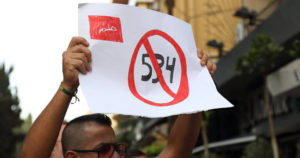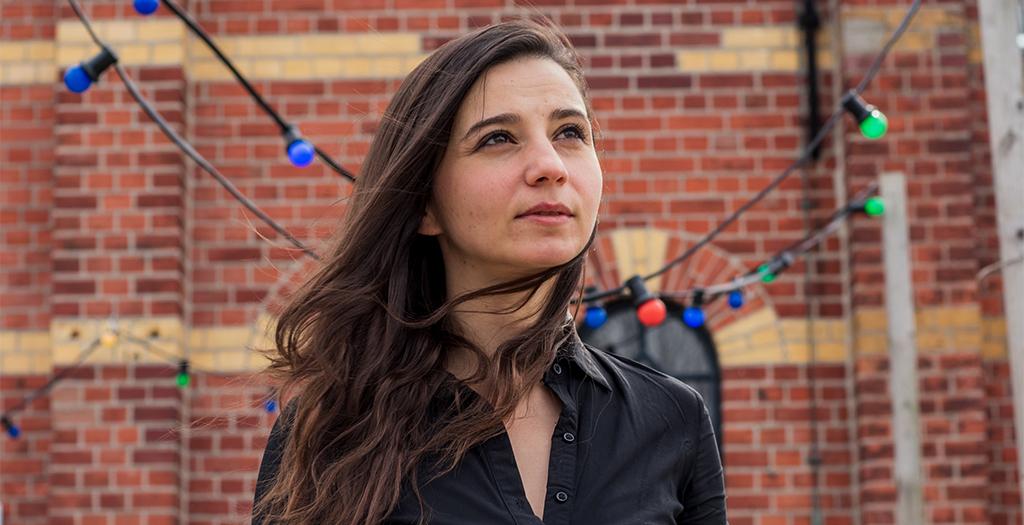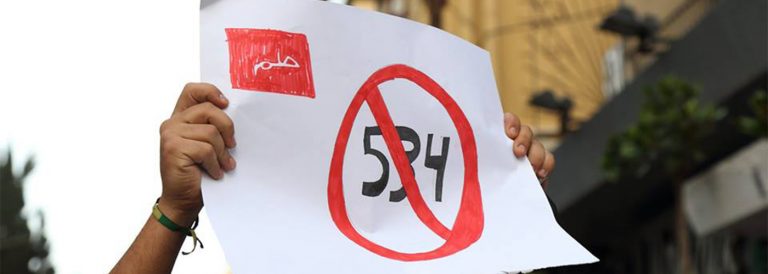How we support courageous LGBTIs in Lebanon
"It all started with a group of five friends in Beirut. Right now, we’re a movement of five organizations and more than a thousand volunteers. We’re unstoppable.” That is the energetic message of Genwa Samhat, executive director of Helem, the oldest LGBTI organization in Lebanon. Samhat leads the resistance against the infamous Article 534 of the Penal Code which states that “it is illegal to have unnatural sexual intercourse. We sat down with her to hear how Helem’s tireless efforts are slowly paying off.
Genwa Samhat, now 31, has been an activist for over 15 years. She was raised in Tyre, an old Mediterranean harbour town about 80 kilometres south of Beirut. “When I was 16, I got involved with the local youth cultural forum,” Genwa recalls. In 2006, war broke out between Israel and Lebanon, and she fled to Beirut.
Chasing a dream
Genwa stayed in Beirut and started doing civil society work. “After that, I started focusing on sexual rights, and Helem was a logical next step.” Helem, Arabic for dream, is a grassroots organization aimed at creating better social and legal status for LGBTIs. Since 2015, Hivos has been a proud supporter of Helem’s struggle to empower LGBTIs, create resilience in the face of oppression, and provide services to LGBTI people in jail.
Helem was set up as an underground movement nearly 20 years ago. When Genwa joined in May 2014, the organization had lost its offices and had no money in the bank. But a police raid on the Hammam Agha bathhouse was an incident she and other members could not ignore, and they pushed forward. Helem’s investigations revealed that those arrested in the raid and sent to the notorious Hbeish detention center had been subjected to torture. This put the organization back on the map.
If a person comes to us for help, they'll get it.
That help is needed becomes painfully clear when she talks about the climate for the LGBTI community in her country. “Anyone who does not conform to the heterosexual norm faces huge challenges every day. Socially, they suffer stigma and violence. Legally, they have no security because it is still a crime to have a non-normative sexual orientation or gender identity. They don’t get the medical care and educational chances they are entitled to. Even worse, there is violence, abuse, blackmail and rape, and sometimes they are not even safe in police custody. The most vulnerable detainees are transwomen and LGBTI refugees.”
A home and a family
The core of Helem’s approach has been the creation of a Safe Space, or community center. An actual place to come to for those in need of help. Genwa: “Here, as an LGBTI person, you can meet people who look and think alike. You have access to the living room, the library, a fully equipped kitchen, washing machines and showers, which are not always present in shelters.”
The community centre offers a broad range of services, such as psychological support, cultural activities and helping people become involved in a broad range of issues from garbage management, transportation and water pollution to education and women’s rights. “There is a touch of magic in watching the outcast become an involved and critical human being,” Genwa says proudly.
“Everybody has a different story, but we see a lot of people who don’t have a job or a place to stay, especially LGBTI refugees. They have generally fallen victim to blackmail and are in the middle of an identity crisis. They don’t know why they feel the way they do. Especially transwomen, who we often see have been sexually assaulted. Obviously, if that’s what life has thrown at you, you are going to need some support and guidance.”
Producing leaders of change
That brings Genwa to the heart of Helem. With enthusiasm she explains: “It’s all about empowerment, the true engine of our Lebanese sexual rights movement. The best thing is when visitors or people we help become actively involved themselves. They turn into activists, leaders of change.”
It’s all about empowerment, the true engine of our Lebanese sexual rights movement.
Helem now has volunteers in nine committees, each with their own agenda, projects and timeframes, who also contribute to Helem’s activities. The organization helps them find funding and trains them in valuable skills like initiating a movement, strategic planning, budgeting and presentation. Yet Genwa remains humble: “It’s so special to watch people blossom, when all we do is facilitate.”
Effective advocacy
Genwa realises the importance of effective lobbying. “The ultimate goal would be to abolish the infamous article 534. But in the meantime, we’re trying to lower the number of arrests, get access to detainees and fight stigma and discrimination.”
Helem has found effective ways to pursue these ambitious goals. It invites supportive lawyers, bloggers, media workers and activists to round table discussions and hosts one-on-one meetings with political or religious leaders (mostly under the radar so these public figures won’t risk being associated with such a sensitive group).
Eyes and ears everywhere
Another of Helem’s strategies is gathering evidence. The organization carefully documents cases of abuse and rights violations within government institutes and publishes the results. This has become a powerful tool for stopping violence after arrest because Lebanon has signed the UN anti-torture convention, so officials involved will be held accountable. “They know now that we have eyes and ears everywhere, and that we know how to use this information,” Genwa stresses.
“In 2017, we wrote a report on violence against LGBTIs in police stations and jails and submitted it to the UN human rights committee. After that, the Lebanese government adopted all recommendations made by other countries. This is actual commitment. One small yet significant victory.”
Celebrating the wins
Fortunately, there are more victories worth celebrating. Genwa sees small steps in slowly changing the climate for the LGBTIs in Lebanon. “The positive changes we see now are in different areas. Local media, for instance, are now covering LGBTI issues. This was unthinkable 10 years ago, but we have made some allies who are approaching this from a very progressive viewpoint. They are breaking taboos, which is of enormous value.”

Helem, in collaboration with other LGBTI organizations and human rights lawyers, has consistently lobbied judges to liberally interpret article 534, which criminalizes sexual acts contradictory to the ‘laws of nature’. On January 26 2017, they celebrated a significant victory. For the fourth time in the past ten years, a Lebanese judge ruled that this article cannot be used to prosecute consensual sex between people of the same sex, on the grounds that homosexual sex is not “unnatural.”
“A Helem lawyer was able to actually convince judge Maalouf to rule in favour of the accused from a human rights perspective. Not guilty! These judges all used a legal model created by Helem years ago. And we get more and more invitations from students doing their final projects, who want to interview us in high schools and colleges. That, too, is progress.”
We’re unstoppable!
Despite the crackdown by security forces on Beirut Pride 2018, coinciding with the International Day Against Homophobia and Transphobia (IDAHOT), events organized by Helem took place on May 17 as scheduled. Genwa said that they often face pressure but would not cancel events and the movement would keep on going.
Even if they shut us down somehow, there is no stopping the movement.
Genwa remains as optimistic as she is combative. “Of course, there are also many disappointments, lost cases, examples of hate speech and violence. It can be frustrating from time to time, and we really appreciate all the support we can get. But you know what? Helem has evolved into a platform creating more platforms. Even if they shut us down somehow, there is no stopping the movement.”
Helem primarily works in Beirut, but now through the Hivos ARCUS program it is expanding outside the city to decentralize its work and bring change to other areas where it is badly needed. The aim is to create two communities: a transgender community, which would be the first in Lebanon, and a Syrian LGBTI community.






